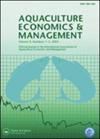What influences the intention to adopt aquaculture innovations? Concepts and empirical assessment of fish farmers’ perceptions and beliefs about aquafeed containing non-conventional ingredients
IF 3.8
2区 经济学
Q1 AGRICULTURAL ECONOMICS & POLICY
引用次数: 15
Abstract
Abstract The Theory of Planned Behavior (TPB) has so far found few applications in aquaculture research. Using Rogers’ innovation adoption characteristics as a complementary framework, we explore its relevance in describing Indian carp farmers’ perceptions of the attributes of fish feed containing non-conventional ingredients (seaweeds, freshwater macrophytes, microalgae and microbes), and in understanding the factors influencing their intention to use these feeds. We find that fish farmers familiar with manufactured feed tend to have more positive attitudes to the inclusion of non-conventional ingredients in fish feed than those who are not. Perceived peer pressure, importance and benefits from the novel aquafeed, perceived comparative advantage and uncertainty regarding outcomes from its use are the main determinants of intention to adopt the proposed feed innovation. The combined application of the TPB and Rogers’ innovation framework provides valuable insights into fish farmers’ attitudes and behavioral intention toward innovation adoption, and we recommend its wider use for designing interventions that promote technological innovations and improved farm management. By exploring the underpinnings of intention to adopt an innovation, our study contributes to the literature on fish farmers’ behavior and attitudes to innovations in aquaculture.是什么影响了采用水产养殖创新的意愿?鱼农对含有非常规成分的水产饲料的看法和信念的概念和经验评估
摘要到目前为止,计划行为理论在水产养殖研究中的应用很少。利用Rogers的创新采用特征作为补充框架,我们探讨了其在描述印度鲤鱼养殖户对含有非传统成分(海藻、淡水大型植物、微藻和微生物)的鱼类饲料属性的看法以及理解影响他们使用这些饲料意图的因素方面的相关性。我们发现,熟悉人工饲料的养鱼户往往比不熟悉人工饲料者对在鱼饲料中加入非传统成分持更积极的态度。感知到的同伴压力、新型水产饲料的重要性和益处、感知到的比较优势以及使用结果的不确定性是采用拟议饲料创新意图的主要决定因素。TPB和Rogers创新框架的结合应用为了解养鱼户对创新采用的态度和行为意图提供了宝贵的见解,我们建议将其更广泛地用于设计促进技术创新和改善农场管理的干预措施。通过探索采用创新的意图的基础,我们的研究为有关养鱼户对水产养殖创新的行为和态度的文献做出了贡献。
本文章由计算机程序翻译,如有差异,请以英文原文为准。
求助全文
约1分钟内获得全文
求助全文
来源期刊

Aquaculture Economics & Management
FISHERIES-
CiteScore
7.30
自引率
17.90%
发文量
21
期刊介绍:
Aquaculture Economics and Management is a peer-reviewed, international journal which aims to encourage the application of economic analysis to the management, modeling, and planning of aquaculture in public and private sectors. The journal publishes original, high quality papers related to all aspects of aquaculture economics and management including aquaculture production and farm management, innovation and technology adoption, processing and distribution, marketing, consumer behavior and pricing, international trade, policy analysis, and the role of aquaculture in food security, livelihoods, and environmental management. Papers are peer reviewed and evaluated for their scientific merits and contributions.
 求助内容:
求助内容: 应助结果提醒方式:
应助结果提醒方式:


